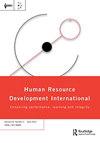Leading through the COVID-19 crisis: a study of the public sector in the Arab Middle East
IF 3.8
Q2 MANAGEMENT
引用次数: 1
Abstract
ABSTRACT This study explores responses of public sector leaders to the COVID-19 crisis and their perceptions regarding the impact of the pandemic. Situated in the under-researched Middle Eastern cultural context, the paper draws on data from qualitative, in-depth semi-structured interviews with public sector leaders in Saudi Arabia and Oman. The qualitative analysis revealed that leaders in both countries responded to the crisis by displaying certain behaviours and actions, including sharing power, finding ways to maintain productivity in a virtual work environment, prioritizing employee well-being, and using effective virtual communication strategies. This study provides evidence that, even with complex challenges and negative effects of the crisis, there is a window of opportunity to reform the workplace and to strengthen group cohesion and solidarity within public organizations. The paper also offers novel insights into leaders’ experiences, contributing to theory and practice in this area. The findings identify approaches for human resource development practitioners and government sectors in embracing collective leadership styles and implementing group cohesion strategies to strengthen organizational culture and ultimately to overcome any future crisis.领导应对新冠肺炎危机:阿拉伯中东公共部门研究
本研究探讨了公共部门领导人对COVID-19危机的反应以及他们对大流行影响的看法。本文位于研究不足的中东文化背景下,采用了对沙特阿拉伯和阿曼公共部门领导人进行定性、深入的半结构化访谈的数据。定性分析显示,两国领导人通过展示某些行为和行动来应对危机,包括分享权力,在虚拟工作环境中寻找保持生产力的方法,优先考虑员工的福祉,以及使用有效的虚拟沟通策略。这项研究提供的证据表明,即使面临复杂的挑战和危机的负面影响,也有机会改革工作场所,加强公共组织内部的群体凝聚力和团结。本文还对领导者的经验提供了新颖的见解,为这一领域的理论和实践做出了贡献。研究结果为人力资源开发从业者和政府部门确定了采用集体领导风格和实施群体凝聚力战略的方法,以加强组织文化,最终克服任何未来的危机。
本文章由计算机程序翻译,如有差异,请以英文原文为准。
求助全文
约1分钟内获得全文
求助全文
来源期刊

HUMAN RESOURCE DEVELOPMENT INTERNATIONAL
MANAGEMENT-
CiteScore
11.40
自引率
11.10%
发文量
43
期刊介绍:
Human Resource Development International promotes all aspects of practice and research that explore issues of individual, group and organisational learning and performance. In adopting this perspective Human Resource Development International is committed to questioning the divide between practice and theory; between the practitioner and the academic; and between traditional and experimental methodological approaches. Human Resource Development International is committed to a wide understanding of ''organisation'' - one that extends through self-managed teams, voluntary work, or family businesses to global enterprises and bureaucracies. Human Resource Development International also commits itself to exploring the development of organisations and the life-long learning of people and their collectivity (organisation), their strategy and their policy, from all parts of the world. In this way Human Resource Development International will become a leading forum for debate and exploration of the interdisciplinary field of human resource development.
 求助内容:
求助内容: 应助结果提醒方式:
应助结果提醒方式:


